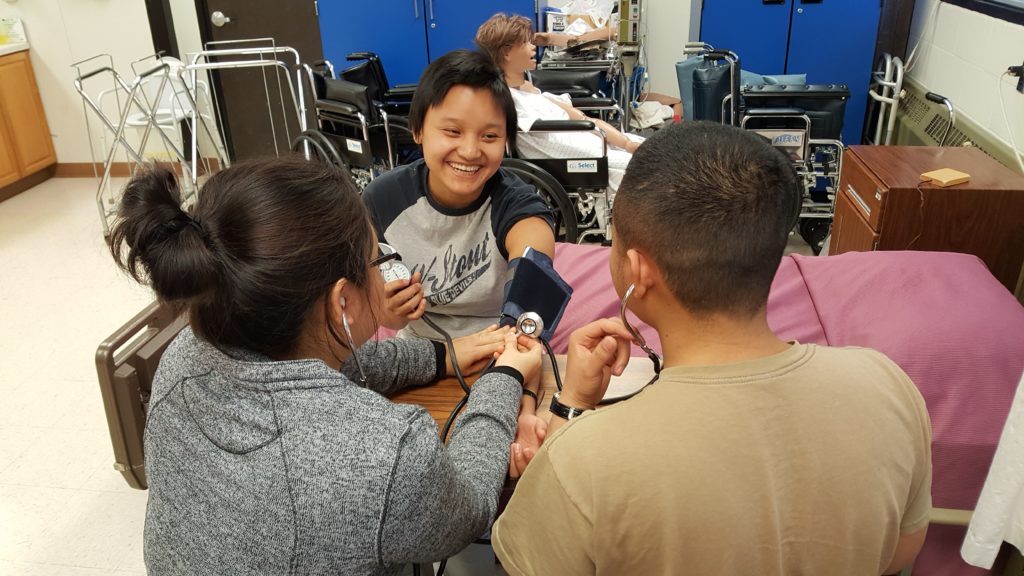
Students in the CNA class at Century College practice taking blood pressure during one of the evening classes.
When Marisa Kheereesantikul was a young girl, she dreamed of becoming a nurse. She grew up in Thailand but came to the U.S. in 1992. Ever since then, she had been taking care of her five kids and working an assembly line job to provide an income for her family.
Her dreams seemed far-fetched until she heard about a free CNA class being offered at Roseville Adult Learning Center where she had been taking classes to receive her high school diploma. When her teachers recommended that she take the class, she signed up.
“I want to do something good for others and it will help me fulfill my dream of becoming a nurse,” said Kheereesantikul.

The class is a collaboration of the Roseville Adult Learning Center (RALC), Century College, and the Karen Organization of Minnesota. Additionally, another CNA class is being taught at Guadalupe Alternative Programs (GAP) with support from KOM. Both classes are part of the Career Pathways Program at KOM that receives funding from the Department of Employment and Economic Development (DEED).
“At KOM we knew a lot of Karen people interested in working in healthcare, and CNA training is the stepping stone to get into nursing,” said Sara Johnson, KOM Career Development Counselor who works with the CNA classes.
The RALC class formed when KOM noticed that refugees from Burma were interested in working in healthcare but didn’t have the English skills necessary to get into other CNA classes. Many other CNA classes require a TABE (Test for Adult Basic Education) score of 6 or higher, but the students in the current class scored lower than this.
“We didn’t want to worry about a test score,” said Johnson. “The teachers at Roseville know the students well and what they are capable of, and they just want to make the class accessible to these students.”
The RALC class began in February 2017 and runs for 16 weeks. Students go to Century College two nights a week for class and go to RALC one night a week to review and receive extra support. Johnson and Lynette Roland, employed by RALC, lead the study sessions on Monday nights.
The GAP class began in September 2016 and runs the entire school year. Students go to the GAP CNA class Monday to Friday along with their high school classes and have the opportunity to receive after-school support two days a week. Johnson offers help with homework, resume writing, completing the FAFSA, and more.

Both CNA classes give refugees from Burma and other English language learners a better chance at becoming a CNA. In addition to the free tuition, they receive language support and career planning assistance.
All of these things are important to the CNA students, because many of them have a goal of becoming a nurse someday. If they can overcome the first stepping stone of becoming a CNA, then they are more likely to continue pursuing their goal to give back to their community.
“I am taking the CNA class because I want to help my family and other people. My future goal is to become a nurse and help people who are sick,” said Naw Thay Su, a student in the CNA class at GAP.


 (651)788-7593
(651)788-7593


